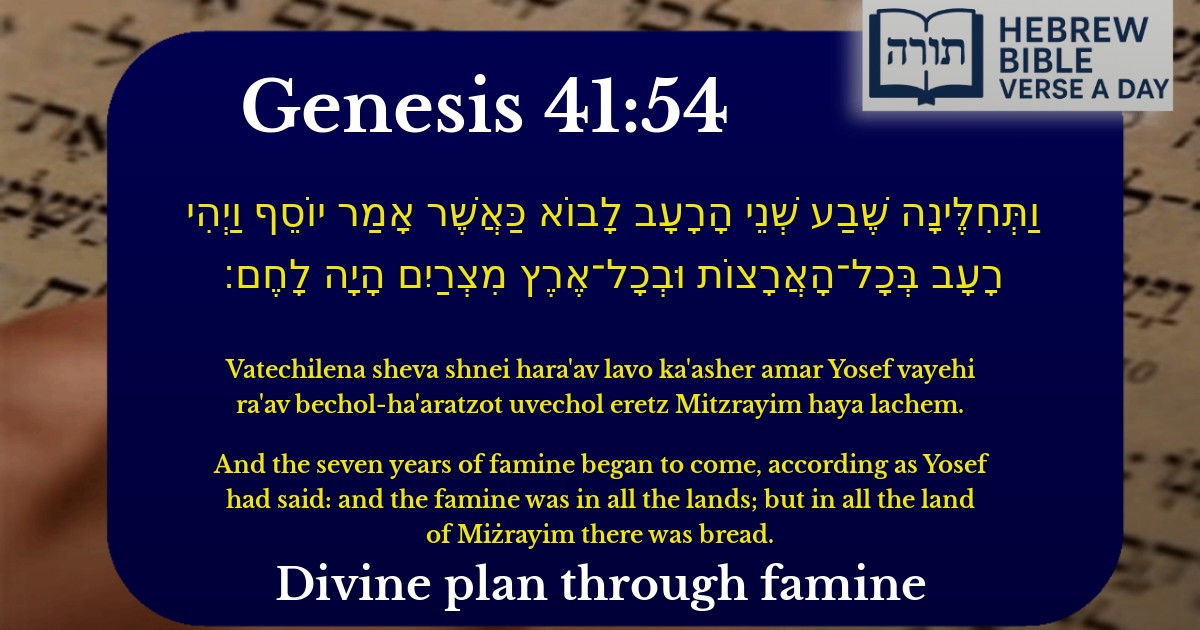Join Our Newsletter To Be Informed When New Videos Are Posted
Join the thousands of fellow Studends who rely on our videos to learn how to read the bible in Hebrew for free!
Hebrew Text
וַתְּחִלֶּינָה שֶׁבַע שְׁנֵי הָרָעָב לָבוֹא כַּאֲשֶׁר אָמַר יוֹסֵף וַיְהִי רָעָב בְּכָל־הָאֲרָצוֹת וּבְכָל־אֶרֶץ מִצְרַיִם הָיָה לָחֶם׃
English Translation
And the seven years of famine began to come, according as Yosef had said: and the famine was in all the lands; but in all the land of Miżrayim there was bread.
Transliteration
Vatechilena sheva shnei hara'av lavo ka'asher amar Yosef vayehi ra'av bechol-ha'aratzot uvechol eretz Mitzrayim haya lachem.
Hebrew Leining Text
וַתְּחִלֶּ֜ינָה שֶׁ֣בַע שְׁנֵ֤י הָרָעָב֙ לָב֔וֹא כַּאֲשֶׁ֖ר אָמַ֣ר יוֹסֵ֑ף וַיְהִ֤י רָעָב֙ בְּכׇל־הָ֣אֲרָצ֔וֹת וּבְכׇל־אֶ֥רֶץ מִצְרַ֖יִם הָ֥יָה לָֽחֶם׃
וַתְּחִלֶּ֜ינָה שֶׁ֣בַע שְׁנֵ֤י הָרָעָב֙ לָב֔וֹא כַּאֲשֶׁ֖ר אָמַ֣ר יוֹסֵ֑ף וַיְהִ֤י רָעָב֙ בְּכׇל־הָ֣אֲרָצ֔וֹת וּבְכׇל־אֶ֥רֶץ מִצְרַ֖יִם הָ֥יָה לָֽחֶם׃
🎵 Listen to leining
Parasha Commentary
📚 Talmud Citations
This verse is not quoted in the Talmud.


Fulfillment of Yosef's Prophecy
The verse (Bereishit 41:54) describes the onset of the seven years of famine exactly as Yosef had foretold during his interpretation of Pharaoh's dreams. Rashi emphasizes that the phrase "כַּאֲשֶׁר אָמַר יוֹסֵף" ("as Yosef had said") serves to highlight the divine accuracy of Yosef's prophecy, demonstrating that his wisdom came from Hashem. The Midrash (Bereishit Rabbah 91:5) notes that this fulfillment established Yosef's credibility in the eyes of the Egyptians, paving the way for his rise to leadership.
Contrast Between Mitzrayim and Other Lands
The verse contrasts the famine's universal impact ("בְּכָל־הָאֲרָצוֹת") with the situation in Mitzrayim, where "הָיָה לָחֶם" ("there was bread"). The Ramban explains that this was a direct result of Yosef's divinely guided administration—his storage of grain during the seven years of plenty (as commanded in Bereishit 41:35-36) ensured Mitzrayim's survival. The Talmud (Ta'anit 11a) derives from this that proper governance and foresight are essential to avert crises, a principle applied to communal leaders.
Divine Providence in the Famine
The Sforno observes that the famine was orchestrated by Hashem to set the stage for Yaakov's family to descend to Mitzrayim, fulfilling the covenant with Avraham (Bereishit 15:13). The phrase "וַתְּחִלֶּינָה" ("began to come") suggests a gradual intensification, which the Kli Yakar interprets as a merciful delay, allowing nations time to seek solutions—ultimately directing them to Yosef, who embodied divine wisdom.